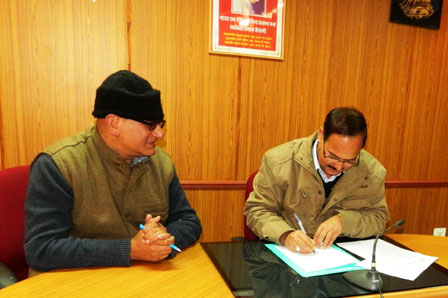MOU for lab-to-land approach
The GBP Institute for Himalayan Environment and Development (GBPIHED), an autonomous institute under Ministry of Environment and Forests (MoEF), has initiated implementation of lab-to-land approach by signing a Memorandum of Understanding (MoU) with the Central Himalayan Environment Association (CHEA). This is the first ever MoU that is signed with the voluntary organisation by the institute responsible for environment and development in the Indian Himalayan region.
After signing the MoU at the institute's headquarters at Kosi-Katarmal, GBPIHED Director Dr. P. P. Dhyani said "the Himalayan region is getting warmer than the global average and adaptation to climate change, water and energy are new emerging challenges in the Indian Himalayan Region, spread over 12 states covering India's 16 per cent geographical area".
Dr. Dhyani said "in an era of climate change it was crucial to reach out to the communities and coordinate with voluntary organisations and expressed hope that with the signing of the MoU, the institute will be better equipped to transform and improve the standards of its research through the efforts of CHEA, an organisation working on environment and livelihood issues since 1981, and similar organisations".
Dr. Pushkin Phartiyal, Executive Director of CHEA is of opinion that, "collaborative efforts between the two entities will be useful for gaining valuable in-sight on developmental efforts. The collaboration would be useful for brining in policy directives with learning from the research and actions at grassroots."
Dr. T. S. Papola, Chair, CHEA, Prof S. P. Singh and other council members of CHEA welcomed the signing of MoU for collaboration in the areas of research and development. Responding to the MoU Dr. Eklabya Sharma, Director Operation and Programme, ICIMOD see it as a welcome step and an example for mountain regions while Dr. Rajan Kotru Regional Coordinator of trans-boundary initiative at ICIMOD said, "Lots of success and positive outcomes I wish for your timely collaboration. This will go long way in setting the contours for networking and leveraging mutual strengths and expertise for the benefit of the mountain people and ecosystems alike."

